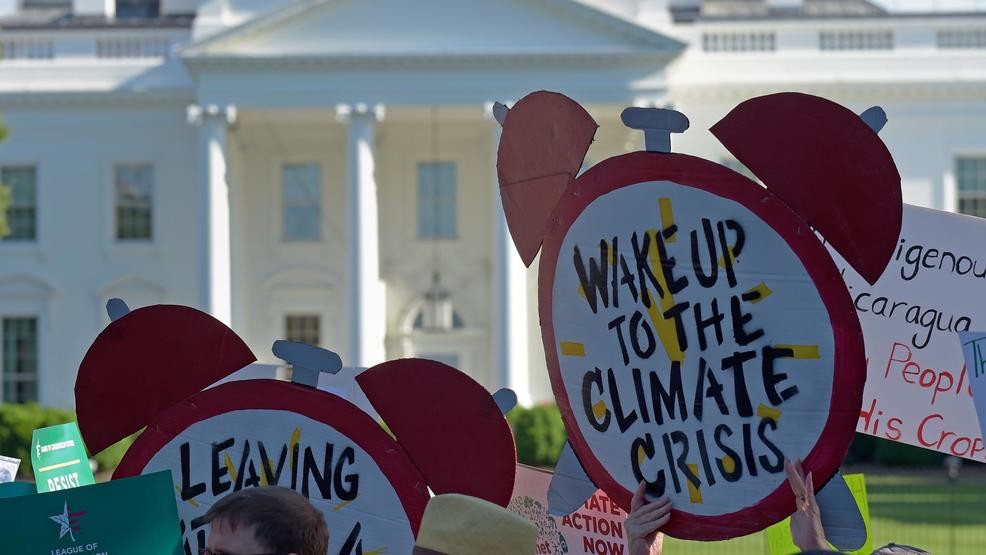Reaction came fast and furious from Oregon and Washington’s political leaders to President Donald Trump’s announcement Thursday that he was pulling the United States out of a global pact aimed at combating climate change.
The Democratic leaders sharply criticized the Republican president’s decision to withdraw or renegotiate the Paris Agreement, in which 190 countries in 2015 pledged work to reduce greenhouse gas emissions and combat climate change.
In response to the president’s decision, Washington’s Gov. Jay Inslee, along with the governors of New York and California, announced the creation of the United States Climate Alliance that seeks to form a coalition of states to uphold the Paris Agreement and continue the fight against climate change.
“I am proud to stand with other governors as we make sure that the inaction in D.C. is met by an equal force of action from the states,” said Inslee. “Today’s announcement by the president leaves the full responsibility of climate action on states and cities throughout our nation.”
Inslee, California Gov. Edmund Brown Jr. and New York Gov. Andrew Cuomo will be the co-chairs of the coalition and urged other states to join them.
In her statement following Trump’s announcement, Oregon’s Gov. Kate Brown said her state would remain committed to fighting climate change.
“It is irresponsible for the president to deny these real-world implications,” she said. “But I will continue to work with leaders on the West Coast, across the country, and around the world to address the challenge of climate change.”
KATU asked the governor’s office whether she would formally add Oregon to the United States Climate Alliance. In response, her spokesman, Bryan Hockaday, emailed the following statement.
Governor Kate Brown is committed to collaborating with all partners dedicated to combating climate change, even as the White House takes the irresponsible step to retreat. As members of the Pacific Coast Collaborative, Oregon, Washington, California, as well as British Columbia, are demonstrating that collaboration makes is huge difference in pursuit of greenhouse gas reduction goals and working toward the development of a greener, cleaner energy mix of the future. As more states commit to collaborating to work towards the goals of the Paris Agreement, Governor Kate Brown looks forward to making meaningful strides to ensure our communities and economies are resilient and better prepared to meet the challenge of climate change.
The leaders of the states and British Columbia that Hockaday mentioned signed the Pacific Coast Collaborative agreement in 2008. That agreement formalized cooperation among those entities to work on issues facing the region, including dealing with the effects of climate change.
Oregon’s two senators also condemned the announcement, saying the action will hurt America’s economy.
“Almost every other country in the world knows that climate change is one of the major challenges of our time and has signed up to do something about it,” U.S. Sen. Ron Wyden said. “The United States must be part of the solution and keep its seat at the global decision-making table.”
He also said pulling out of the agreement will cause job losses in the United States because American businesses will find it harder to compete.
U.S. Sen. Jeff Merkley also said America’s absence from the accord will hurt U.S. workers.
“The American business community, including 58 Fortune 500 CEOs, strongly supports the Paris agreement. These businesses know that withdrawing will cede American leadership on the world stage, and diminish American economic opportunity,” he said. “If we don’t aggressively lead the clean energy revolution, other nations will beat us — and they will capture the rewards in growing jobs and prosperity.”
However, Portland-based Cascade Policy Institute said Trump’s move was the right one.
“It was a terrible deal for American taxpayers who would have been required to send many billions of dollars to an international green slush fund, with no accountability,” said the institute’s President and CEO John Charles. “The Paris accord was always a triumph of symbolism over substance. Now that American participation has ended, we can appropriately move on to issues of real significance.”
It will take four years for the United States to officially withdraw from the agreement. That means the U.S. will remain a part of it until 2020, just after the next election.
Meanwhile, Trump’s attempts to renegotiate the accord may hit a roadblock. The Associated Press reported that France, Germany and Italy said in a joint statement that that wasn’t possible














